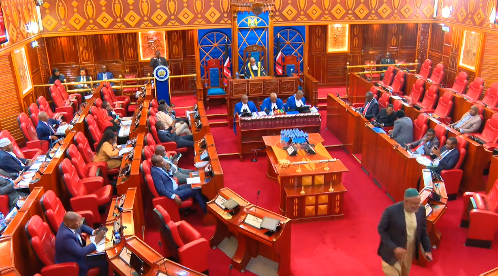Transparency International faults Senate amendments to Conflict of Interest Bill

The organisation expressed "profound disappointment and alarm" at the Senate’s recent unanimous decision to mutilate the Conflict of Interest Bill (National Assembly Bill No. 12 of 2023) through "atrocious" amendments that negate the rule of law and constitutionalism.
Transparency International-Kenya has faulted the Senate for attempting to weaken laws that prohibit corruption and other economic crimes in the country.
In a statement released on Monday, the human rights lobby said that the Senate's amendments to the Conflict of Interest Bill, which allow public officers and families to do business with the government without sanctions, should not be allowed as they will abet more corrupt practices.
More To Read
- MP Babu Owino leads petition seeking to halt new Conflict of Interest law allowing political activity by state officers
- Kenya loses Sh194.8 billion annually to illicit financial flows, Transparency International warns
- Ruto assents to Conflict of Interest Bill after protracted parliamentary tussle
- World Bank withholds Sh96.93 billion loan to Kenya over delayed reforms
- Devolution at risk as projects remain incomplete across counties
- Senators, Woman Reps face lowest re-election chances in 2027 poll - survey
The organisation expressed "profound disappointment and alarm" at the Senate’s recent unanimous decision to mutilate the Conflict of Interest Bill (National Assembly Bill No. 12 of 2023) through "atrocious" amendments that negate the rule of law and constitutionalism.
"By removing the sanction that defines conflicts of interest and stripping the Ethics and Anti-Corruption Commission (EACC) of its implementing authority, the Senate of the Republic of Kenya has severely weakened the Conflict of Interest Bill, compromising the fight against corruption and effectively legalising state officials' ability to engage in self-serving business practices without fear of punishment," TI-Kenya said in the statement.
It added that it is illegal and unconstitutional for the Senate to abdicate its role under Article 96(2) to effectively consider and approve bills that concern counties, especially those that affect the finances of county governments.
TI-Kenya said that the Senate's decision to delete provisions that sanction conflict of interest from both the bill and existing laws, such as the Anti-Corruption and Economic Crimes Act of 2003, effectively remove any deterrent against state officials conducting business with the government or awarding tenders to relatives.
"Additionally, transferring the enforcement role from the EACC to public entities creates a significant conflict of interest, as officials will now be responsible for investigating their misconduct."
The organisation avers that this decision violates Article 79 of the Constitution of Kenya 2010, which mandates EACC to ensure compliance and enforcement of the provisions of Chapter Six (6) of the Constitution, which outlines the conduct of state officers under Article 75 and restricts certain activities from being undertaken by state officers.
The lobby is of the view that the passage of the bill with Senate amendments will jeopardise the conflict of interest-related offences currently being investigated or in court.
"For example, most governors currently in court face charges relating to conflicts of interest and are charged alongside family members," notes the lobby.
They have continued to say that the Senate’s actions erode public trust in the government’s willingness to establish necessary legal structures to address the root causes of corruption.
TI-Kenya wants the National Assembly to reject the Senate’s amendments and restore the bill to its original form, and for President William Ruto to withhold assent from any version of the bill that fails to uphold robust anti-corruption measures.
"Moving forward, TI-Kenya will intensify its advocacy for strong, enforceable laws that hold public officials accountable and protect public resources," the statement said.
The organisation promised to continue engaging with stakeholders, including civil society, development partners, and the Kenyan public, to ensure the fight against corruption remains a top priority.
Top Stories Today















































